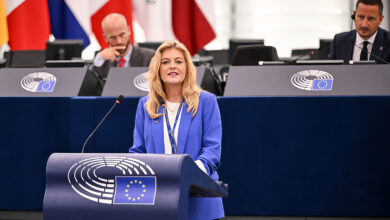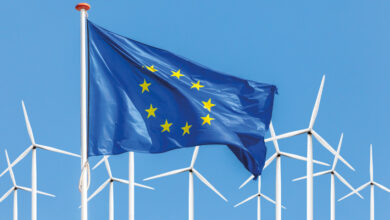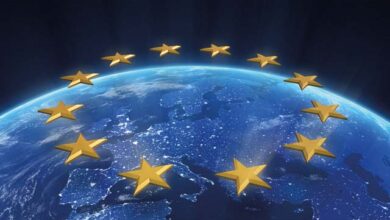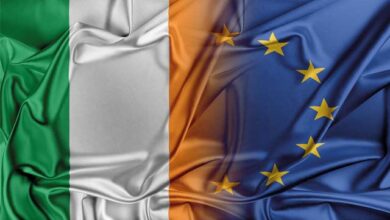EU is not to blame for dairy crisis
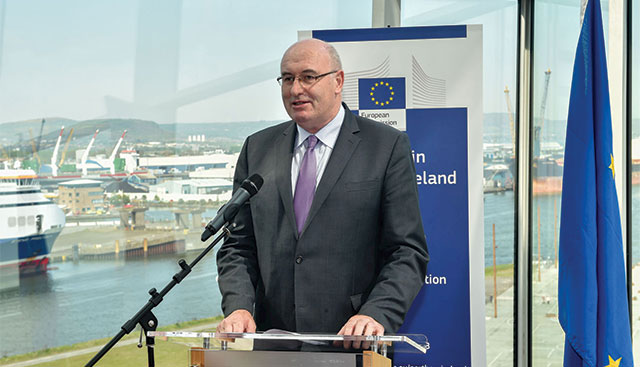
Over production of milk in Europe, primarily emanating from Ireland, is not the reason why international dairy markets are so depressed at the present time, according to EU agriculture commissioner Phil Hogan.
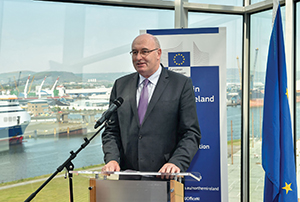 During a recent trip to Belfast, Commissioner Phil Hogan gave the annual Gibson Lecture at Queen’s University Belfast. He was responding directly to claims, previously made by United Dairy Farmers’ Chief Executive David Dobbin, to the effect that an over-supply of milk in Europe is at the very heart of the income crisis now confronting most dairy farmers throughout Ireland and beyond.
During a recent trip to Belfast, Commissioner Phil Hogan gave the annual Gibson Lecture at Queen’s University Belfast. He was responding directly to claims, previously made by United Dairy Farmers’ Chief Executive David Dobbin, to the effect that an over-supply of milk in Europe is at the very heart of the income crisis now confronting most dairy farmers throughout Ireland and beyond.
He said: “It is a problem, for the most part, created by extremely weak markets around the world, and not over production in the EU. The EU food embargo introduced by Russia remains in place and dairy imports into China fell by 57 per cent last year.
“The EU has responded by strengthening intervention and private storage aid support while, at the same time seeking new markets for our dairy produce.”
Hogan used the lecture to espouse the benefits of Northern Ireland – and the rest of the UK – remaining within the EU.
“The role of the Commission is to put forward the facts, where the UK’s membership of the European Union is concerned,” he stated. And for Northern Ireland’s agri food sectors, he commented that: “Single Farm Payments to farmers in Northern Ireland will be worth in excess of £2.3 billion from 2014-2020. To put that figure into perspective, annual payments from the European Union account for 87 per cent of annual farm incomes, compared to 53 per cent in the UK as a whole.
“In other words, for every £10 sterling that Northern Ireland farmers earn, the Common Agricultural Policy accounts for £8.70 of that total.”
The Commissioner continued: “In addition, the current EU support budget for agriculture is guaranteed up to 2020. And there is no certainty that the Treasury in London would come anywhere near replicating these support levels, should Brexit become a reality.
“To put it more bluntly, were it not for European assistance, many farms would not alone generate significant losses, but would struggle, and in many cases fail, to survive.”
Hogan pointed out that under the last European budget period between 2007 and 2013, 9 per cent of Northern Ireland GDP was attributable to EU support. Of this, two thirds of the money was accounted for by agriculture.
Hogan added: “It would be remiss of me not to mention the £144 million in EU structural funds which Northern Ireland drew down in 2015 alone, to invest in crucial infrastructure such as rural broadband and water.
“The Common Agricultural Policy is not only important from an economic point of view: it also provides today’s discerning consumers with safe, high-quality food to feed their families. Our standards for traceability and quality are the highest in the world. Northern Ireland led the way in this race to the top for traceability, being the first region in the world to have a cattle identification system which was introduced some 25 years ago.”
Turning to trade, Hogan said that he recently travelled to China and Japan with a delegation of EU agri-businesses: “While there we met government officials, agri-food sector stakeholders, and like-minded trading companies, with a view to building relationships to deepen trade.
“In February, I travelled to Colombia and Mexico with a similar delegation, where we notably signed a new agreement for organic trade with Colombia – a rapidly growing and high value added consumer market.
“Similarly, we are currently negotiating a free trade agreement with the USA – commonly known as TTIP – which we insist in the final outcome will contain strong protection for our high-quality EU products and offer great new opportunities for trade.
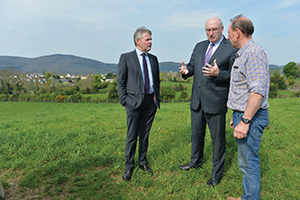 “All this work deal will benefit export-minded farmers and agri-businesses in Northern Ireland and throughout Europe. These are just some of the many examples highlighting that the European Union doesn’t moderate or tame the influence of Northern Ireland: it magnifies it.”
“All this work deal will benefit export-minded farmers and agri-businesses in Northern Ireland and throughout Europe. These are just some of the many examples highlighting that the European Union doesn’t moderate or tame the influence of Northern Ireland: it magnifies it.”
Hogan highlighted the implications of Brexit for trade, business and community relationships across the island of Ireland as a whole.
“Trade flows of food produce between the UK and Ireland are larger than bilateral flows that either has with any other country in the entire world, accounting for nearly £4 billion on a yearly basis,” he said.
“Indeed, the UK exports more to Ireland than it does to China, Japan, Canada, Russia, Saudi Arabia and South Korea combined. In recent years, numerous partnerships have developed between co-ops and agri-businesses on both sides of the border, particularly in the dairy sector.
“Our trade relationship has had a stunning effect on the local economy in Ireland as a whole. Almost 200,000 people in the Republic now work in sectors that benefit from this export relationship with the United Kingdom. Over 600,000 Irish citizens travel back and forth on a regular basis for work in the UK and approximately 400,000 British citizens are resident in Ireland.
“Many now travel on a daily basis between both states. I have no need to tell this audience how many people live and work on either side of the border, crossing daily while working in essentially the same communal space – carrying both euros and pounds – the EU and the UK in their pockets.”
The commissioner continued: “We owe it to our fellow citizens, both British and Irish, to ask: how will this movement of people, goods, services and capital be affected in the event of a Brexit?
“If any form of land border is re-introduced, how will this disrupt the substantial cross-border trade in agri-food products? There is constant daily movement of live animals for fattening, and dairy products, to name just two elements of the trading relationship.”
Hogan posed the question: “Will Irish farmers lose tariff-free access to the UK market and vice versa? We must remember that there were quite substantial monetary correction mechanisms in the 1970s. And how will this impact on cross-border smuggling and illegal trade? There will be clear incentives to recreate the old channels of smuggling across the border, and the consequent increase in resources from both states to deal with the problem.
“The relationship between people living and businesses operating either side of the border is one of neighbourliness. I believe that it would be a retrograde step if that relationship was compromised by the potential tariffs, tailbacks and other trade blockages that an external border would entail,” he concluded.

